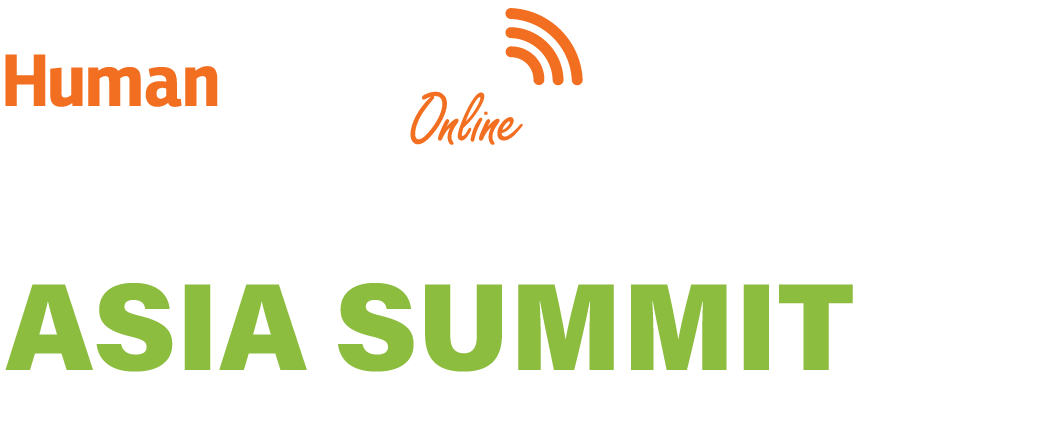Agenda
DAY 1 | 23 JULY 2025
DAY 2 | 24 JULY 2025
Registration
Welcome address

Priya Sunil
Deputy Editor, Southeast Asia
Human Resources Online
Opening speech

Aditi Sharma Kalra
Editor-in-Chief
Human Resources Online
9.20am
[Opening keynote]
Tossing out the rulebook: Painting a portrait of the modern rewards professional
Today, rewards professionals continue to be data-driven, financially astute, and fare well working within specified organisational structures. However, the future rewards professionals are expected to be able to bring more creativity and artistic flair to their work – as they will be tasked with building more human-centric rewards systems.
Let’s peek into what the future has brought to our doorstep, through this session on:
- The shift from fixed to fluid compensation models: Designing more adaptive compensation structures that support business agility.
- With increasing pay transparency laws globally, can rewards leaders help manage cultural issues in approaching this delicate matter?
- Moving the mindsets for C&B professionals to embrace AI, sustainability-linked incentives, and skills-based pay models.
Speaker:

Zain Azrai bin Dato’ Dr. Zaaba
Vice President for Rewards & People Management, Human Capital
10.00am
[Panel discussion]
Scaling smarter, not harder: Optimising technologies for cost-effective rewards operations
As a new wave of technologies promises to improve business outcomes and workflow efficiencies, senior leadership must become proficient in identifying the right technologies for their organisations’ operations.
The integration of technology into the rewards function isn’t just about automation—it’s about scaling personalisation, improving cost efficiency, and driving strategic growth.
In this session, key points of discussion will include:
- Leveraging resources like AI and analytics to identify underutilised or high-impact, low-cost benefits that enhance employee satisfaction.
- The role of technology in creating a cost-efficient hiring process and refining the methodology behind benchmarking for jobs.
- Utilising data-driven platforms and market pricing tools to automate incentives, bonuses or merit increase cycles.
Panellists:

Sajjad Parmar
CEO and Founder

Aman Sahibzada
Compensation & Benefits Service Centre Lead – Asia
GSK

Jessica Loretta
Senior General Manager – Human Resources & Corporate Relations
Wipro Unza Malaysia

Seow Choon Hui
Head, Group Strategic Human Capital Management
10.40am
Morning Break
11.10am
[Case study]
A culture of care: Driving positive organisational change through a meaningful rewards strategy
Organisations across Asia Pacific have used total rewards programmes to attract and retain talent by offering a buffet of benefits to highlight the investment they make in their people. Despite the efforts, these strategies often fail, not only in addressing employees’ most important needs, but also in enhancing their overall employee experience.
A focus on people will enable organisations to redefine their total rewards programmes, ensuring that employees feel seen, valued, and cared for.
In this session, we come together to learn about:
- Why employee-centred care must be at the core of total rewards strategies.
- What offerings can maximise the effects of total rewards programmes to create environments where employees thrive.
- How recognition done well can make a difference in fostering positive mental health practices.

Russell Flint
Director, Asia Pacific
O.C. Tanner

Gina Lee
Lead Advisor, Workplace Culture and Employee Experience Asia
O.C. Tanner
11.50am
[Keynote]
Balancing the rewards equation: The blueprint to a successful C&B programme for the modern workforce
Many organisations struggle with achieving that sweet spot in their organisation’s rewards programmes; where high employee retention and satisfaction rates meet cost-efficient C&B strategies. In order to create a strong employer brand through competitive retention strategies, leaders must carefully consider and analyse what works best for both the business and the employees.
In this keynote session, Faizul Ridzuan of FAR Capital will discuss the following key points for a holistic rewards programme:
- Using flexible working hours and hybrid team set-ups to improve employee retention and satisfaction among younger generations of employees.
- The importance of role-modelling by leaders when setting an example for health and wellbeing across the entire workforce.
- Uplifting the employee corporate benefits programme to ensure employee experience mirrors the high benchmarks for customer experience.

Faizul Ridzuan
Chief Executive Officer
FAR Capital
12.30pm
Networking Lunch
1.30pm
[Lightning talks]
Rewards cannot work in isolation: The making of a skills-powered organisation
The focus on skills is becoming increasingly important not just as an HR strategy, but a business one as well, regardless of industry. Identifying ways for employers to imbibe a skills-first viewpoint in their human capital processes is the need of the hour.
In this session, we tailor this conversation for compensation professionals to start thinking about:
- The potential to pay a premium for in-demand skills or to reward scarce talent pools into compensation packages.
- Using data to identify which roles this may be most impactful in, such as those with high attrition or competitive industry salaries.
- Driving clarity in how skills-based pay frameworks are positioned to the workforce as a benefit vs an entitlement.

Mohd Ifran Md Nor
Head of Rewards and Organisational Development
Boost Holdings

Nazrul Effendy
General Manager, Total Rewards
[Case study]
Flex benefits reimagined: The perks and perils of personalisation
Personalised benefit packages continue to be seen as a valuable factor in boosting employee satisfaction and retention. However, what has changed is that several organisations are pivoting to organisation-wide personalisation, rather than individual personalisation, in a bid to make the power of choice more cost-effective and optimised for maximum usage.
Let’s shine a fresh spotlight on the topic of flexible benefits as we discuss:
- Potential move from personal level benefits to company level flexible benefits, to improve utilisation and cost efficiency.
- Advantages and risks of tailoring benefits to meet employee’s expectations in today’s multigenerational workforce.
- Leveraging data and analytics to anticipate needs, tailor offerings, administer options, and track utilisation.

Cedric Deschamps
CEO
Pacific Prime Malaysia

Kumara Venthen
Business Development Manager
Pacific Prime Malaysia
2.50pm
Afternoon Tea Break
3.20pm
[Case study]
The holistic approach to workplace wellbeing
This talk is designed to provide insights into the importance of employee wellbeing and the initiatives that can be implemented to support it. The objective of this talk is to understand the benefits of a holistic approach to wellbeing, highlighting the positive impact it can have on employees’ lives and overall job satisfaction.
In this session, the following key points will be addressed:
- The six essential pillars of wellbeing (Financial, Psychological, Social, Physical, Workplace, and Ethics)
- Discover diverse initiatives to enhance overall wellbeing.
- Recognise the benefits of a holistic wellbeing approach on employee satisfaction, productivity, and job performance.
Speakers:

Terry Khoo
Vice President of Human Resources
4.00pm
[Lightning talks]
The pursuit of happiness: Fostering social wellness to drive inclusion and belonging at the workplace
One of the most well-established concepts in positive psychology is the PERMA model, which found that wellbeing consists of five elements: positive emotions (P), engagement (E), positive relationships (R), meaning (M), and accomplishment (A). This points us to importance of social wellness—how employees connect, collaborate, and feel included—and the need for rewards to focus on holistic wellbeing for better job performance.
In this session, we will address:
- Strategies to integrate social wellness into the total rewards framework, aimed at measurable impact on employee engagement.
- Best practices for building a workplace culture where employees feel valued, connected, and empowered to thrive.
- Practical steps that can help to strengthen psychological wellbeing in hybrid and remote teams.
Speakers:

Vasumathi Balan
Regional Talent Capability and Performance Manager

Sue Ann Lim
Head of OSH, Supply Chain Management & Wellbeing
CelcomDigi
4.40pm
Closing address

Priya Sunil
Deputy Editor, Southeast Asia
Human Resources Online
5.00pm
End of Day 1 of Total Rewards Asia Summit 2025
DAY 2 | 25 JULY 2024
8.15am
Registration
Welcome address

Priya Sunil
Deputy Editor, Southeast Asia
Human Resources Online
9.20am
Progressing beyond payslips: Rethinking the EVP from a C&B perspective
Hiring managers often tend to ask: “How much were you earning in your last role?”. However, it is time to look past how much a candidate was making previously, and assessing their pay based on internal benchmarking.
In this session, we cover the huge opportunity to shake up the EVP by bringing in a conscious total rewards component – that establishes the organisation’s stance on how it pays its talent, irrespective of industry benchmarks.
Get set for a discussion on:
- Moving beyond past pay to determine future pay: Establishing the fair market value of roles and assessing internal skills demand.
- Clearly defining the compensation philosophy as part of the EVP: Does the organisation want to take a lead/lead or lead/lag approach?
- The need for compensation business partners to exert this level of influence during and prior to the hiring process, for candidate clarity.

Vivek
Group Head of Talent & Culture
SKS Hospitality
10.00am
Transactional to transformational: Creating high-impact rewards that shape company culture
Workforce trends point towards a necessity for devoting greater resources and budgets towards creating a high-impact company culture as part of the rewards function’s mandate. Organisations must go beyond performative pay strategies, to ensure that core values and company mission are strongly reflected in the way employees are rewarded.
Here are some of the key points that will be addressed in this session:
- A blueprint for taking a culture-first approach to transformational rewards strategies that reinforce desired cultural outcomes.
- Addressing reasons behind why financial incentives without cultural alignment will fail to create meaningful impact.
- Discussing real, on-ground feedback and perspectives to keep rewards messaging aligned to business realities.

Wendy Khek
Head of Human Resources & Operations

Nurul Ili Jamaluddin
Group Head of Rewards
Jebsen & Jessen Group
10.40am
Morning Break
11.10am
Global mandates vs local requirements: Streamlining rewards operations and strategies across regions
A standardised rewards strategy ensures consistency, equity, and alignment with corporate goals, but local regulations, cultural expectations, and cost-of-living differences necessitate flexibility. Thus, determining the scalability of such standards to the local context becomes a challenge.
In this session, we will look at actionable frameworks that organisations can implement when standardising rewards operations regionally, while taking local needs into consideration:
This discussion will cover the following points:
- Economic and legislative considerations when implementing a global standard within the local context.
- Best rewards practices for celebrating cultural diversity and inclusivity, while allowing teams to feel valued.
- Cross-regional practices to leverage closer collaboration, a balanced approach, operational efficiency and legal compliance.
Speaker:

Reena Talla
Employee Experience Service Lead
11.50am
Flexibility in focus: Crafting workforce strategies for diverse needs and expectations
With five generations in the workforce, organisations are faced with a spectrum of evolving needs, ways of working, priorities, and expectations. They are having strategic workforce conversations about not only when we work, but where and how. A new wave of flexible options is emerging to suit the diverse requirements of a multi-generational workforce.
In this session, we will discuss:
- How the shift away from “traditional” roles, titles, and responsibilities is impacting the considerations on the talent strategy.
- Ways to balance the need to retain talent and develop skills, with the need to deliver business objectives and remain compliant.
- Adapting rewards strategies for diverse needs based on your corporate culture and priorities.
Panellists:

Ushananthini Gunasegaran
Director of Human Resources, Asia Pacific
Speedcast

Faizul Ridzuan
Chief Executive Officer
FAR Capital

Theepen Manokaran
Senior Manager, Employee Relations – APAC
ResMed

Rashidin Omar
Assistant General Manager, Remuneration & Performance Management
Telekom Malaysia
12.30pm
Networking Lunch
1.30pm
Trivia Time!
Networking session
1.50pm
[Keynote]
Actions speak louder than cash: Boosting engagement through non-monetary recognition
Psychological research suggests that recognition tied to purpose, impact, and development can outweigh the perceived worth of cash incentives. But how can companies make this kind of recognition both visible and effective, especially in dispersed workplaces with hybrid working styles?
On the cards for this presentation, we will discuss:
- How to ensure that recognition—such as career development, meaningful work, and direct feedback—feels authentic and valued.
- Strategies to make non-monetary recognition resonate in remote and hybrid settings, where visibility and impact can be diluted.
- Leader’s roles in effectively linking non-monetary recognition to business goals, so employees can clearly see the impact of their contributions.
Speaker:

Dr Vimalambigai Muthusamy
Head of HR, ASEAN and Transition Lead HR Operations
Barry Callebaut Services Asia Pacific
2.30pm
Challenging time-tested notions: Is job grading still relevant or do we need an overhaul?
If the momentum on skills-based jobs continues to maintain pace, traditional methods of job grading might struggle to keep up with the new-age requirements. Even presently, many organisations have outdated structures that are unable to recognise low/high performance or the value of experiences, leading to frustrated or confused workforces.
In this session meant to ignite provocative conversations, we will discuss:
- The end of job titles: What is a feasible alternative to current job grades that favour seniority and tenure over skills and experiences?
- Equitability vs fairness: Is there a need for a new definition of variable pay to tackle both needs?
- The principles of a skills-based compensation framework to support or replace existing models either through structure or flexibility.
Panellists:

Sow Chat Gan
International Benefits Leader

Iswadi Zainuddin
Head of Total Rewards
Gentari Group

Faiza Mat Saaid @ Abdullah
Director, People Development, Performance & Rewards
Touch ‘n Go

Ashvine Krishnan
Group Head of Human Resources
Xamble Group Limited
3.10pm
Afternoon Tea Break
3.40pm
Lean, agile, and purpose-driven: How rewards schemes in SMEs vs MNCs are same-same but different
The way motivation drivers and reward schemes are structured in startups/SMEs and larger organisations vary significantly, mainly due to differences in resources, organisational structure, and culture.
In this session, we have two speakers representing each organisation type, sharing their experiences and learning from each other, on the following:
- How to define employee motivation, and the biggest factors influencing it.
- Demystifying the misconceptions around long-term incentives such as equity or ESOPs, and their role in powering performance.
- Blending the best of both approaches, to balance both intrinsic and extrinsic factors in rewards strategies.
Speakers:

Kenneth Z Tan
Chief People Officer
Aonic

Adriad Choo Kok Wai
HR & Admin Director
4.20pm
Ambassadors of compensation: Empowering managers to navigate sensitive pay conversations with confidence
Managers play a pivotal role in translating pay strategies into simple terms for employees. Yet, many managers struggle with addressing employee concerns and are unable to provide the big-picture imperatives that comprise the pay package. This can lead to misunderstanding, erosion of trust, and even disengagement.
In this session, we aim to tackle the following themes:
- Strategies to equip managers with the skills to navigate difficult discussions and clearly communicate the company’s compensation philosophy.
- Best practices for ensuring managers can clearly articulate the value of customised or case-by-case benefits packages.
- Measuring the success of manager-driven compensation discussions on overall business performance.
Panellists:

Haryati Suradi
Head of Division, Human Capital
Malaysian Communications and Multimedia Commission

Sabrina Mohd Haris Maurice
Chief People Officer

Zulfa Ashida Zulkifli
Vice President Human Resources
Velesto Energy
4.50pm
Closing address

Priya Sunil
Deputy Editor, Southeast Asia
Human Resources Online
5.00pm
